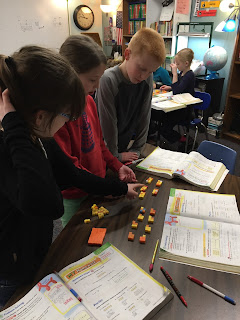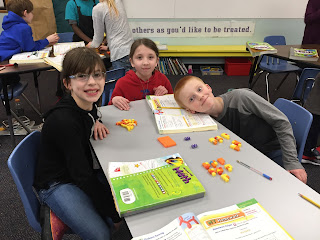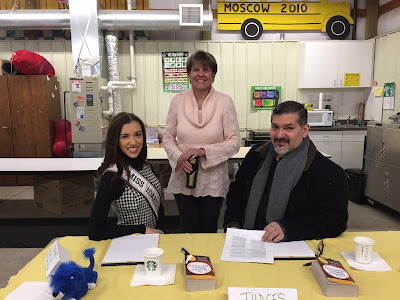 |
| After corrections and each one making sure work is correct, we review by them reading and talking together and at tables. |
4th grade math-- connected.mcgraw-hill.com
Thursday, February 23, 2017
Presenting Self Evaluated Work- Small Book Project and Formative Assessments--What are they?
Friday, February 10, 2017
More modeling math with cute kids and Radio Theater Performances
 |
| Creative process and shoes for sound effects |
The kids have worked so hard on the scripts for the radio theater shows. The process for writing was to read together and take notes on characters, setting, and plot. Then find 10 vocabulary words and do all the great fun things you can do in understanding words when using the dictionary. Then each group created a story arc with me to help as a group know how to introduce the story parts, introduce the problem and build to the climax of the story and then resolve it. It was a great process for them to learn what to keep and write and what wasn't needed.
Learning to create sound affects was really fun. And they kids also got to listen to Radio Classic Theater from the 1940s. The more they wrote the more they got into the theatrics of their characters-- interesting voices and original thuds and footsteps were things that they loved doing. Chau let us borrow her microphone and that made the whole experience more professional.
 |
| Behind the radio and taking turns reading their script. |
 |
| Writing, thinking, talking and more writing. |
 |
| We invited the whole first grad and all of the fifth to hear the stories. Having an audience was nerve racking in such an exciting way. |
Monday, February 6, 2017
Choe and April winners at MLKJr. Breakfast- MCS Spelling Bee 2017--math and script writing for Radio Theater Plays of Literature Circle Books
 |
| Very proud of how these two integrated the Water Ways Exhibit from our visit to City Hall into their art. It made their work more powerful. |
 |
| Long time organizer Joanne Muneta enjoying part of April's poem that the Mayor read. |
 |
| Chloe won for her picture drawing and April won for her poem. Mayor Bill Lambert gave the awards for the kids that won. |

 |
| Kids picked who they wanted to work with and chose from 5 different novels to read and work together. It is fun to discuss academics with people you enjoy. |
 |
| Measuring and writing about the snow experiment |
 |
| Ms. Wold, our 302 UI student works with kids. She has jumped right in teaching math and getting to know the work we are doing. |
 |
| Carefully finding vocabulary to define, character, plot, and setting points. All this was put into a story arc and the the group wrote a radio play. |
 |
| Some of the first participants to come into the MPR. Quite a few came to Spelling Bee Club that met on Tuesdays starting right after the holiday break. |
 The kids worked in tables to model math factors from throwing 4 dice--2 for one factor and 2 for another. Then they used the cubes to set up the factors and if they had enough to make an array of the product. Two tables shared their work with another table.
The kids worked in tables to model math factors from throwing 4 dice--2 for one factor and 2 for another. Then they used the cubes to set up the factors and if they had enough to make an array of the product. Two tables shared their work with another table.  |
| Learning to play Hearts-- strategy and conversation |
Subscribe to:
Comments (Atom)


























